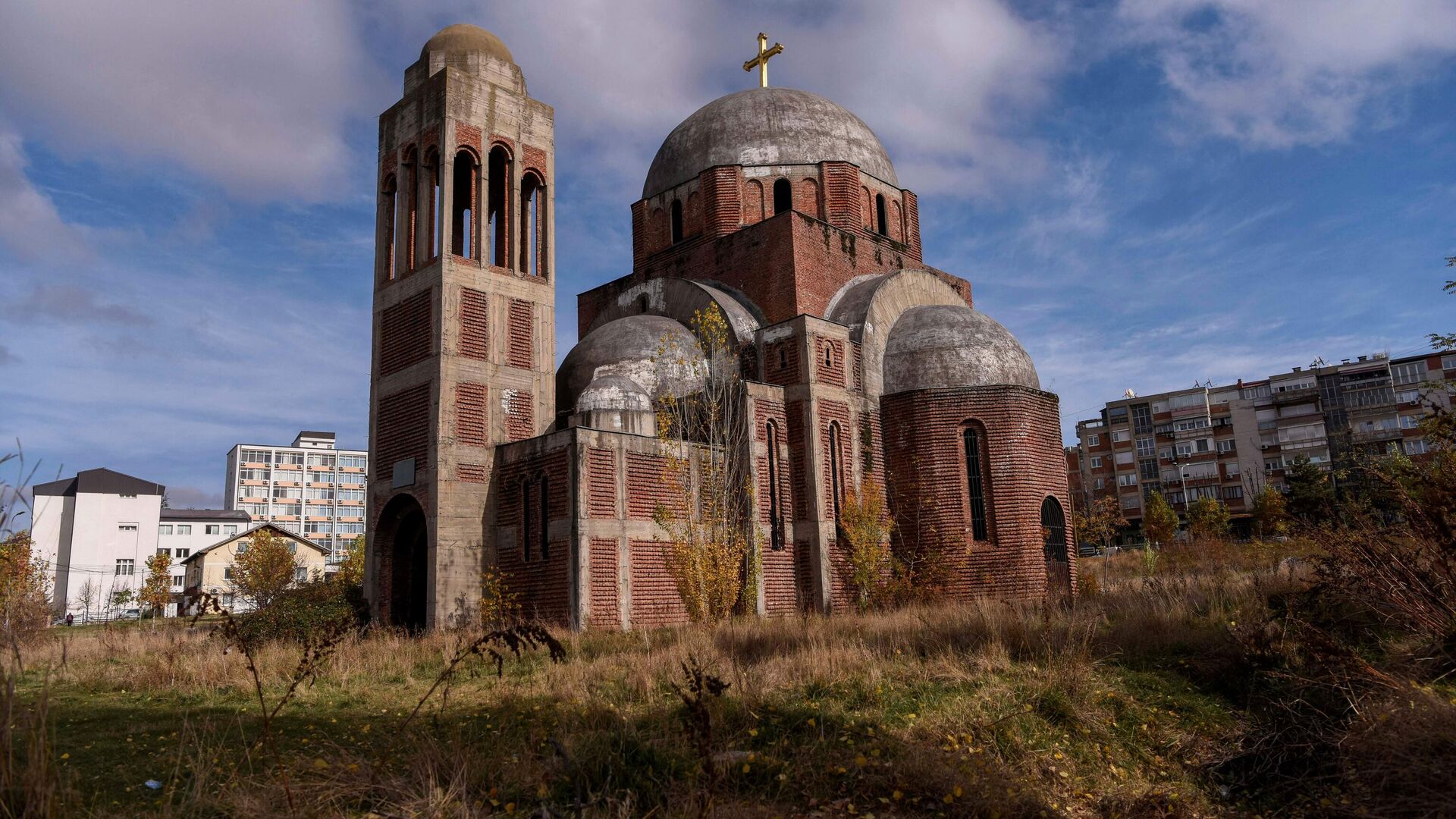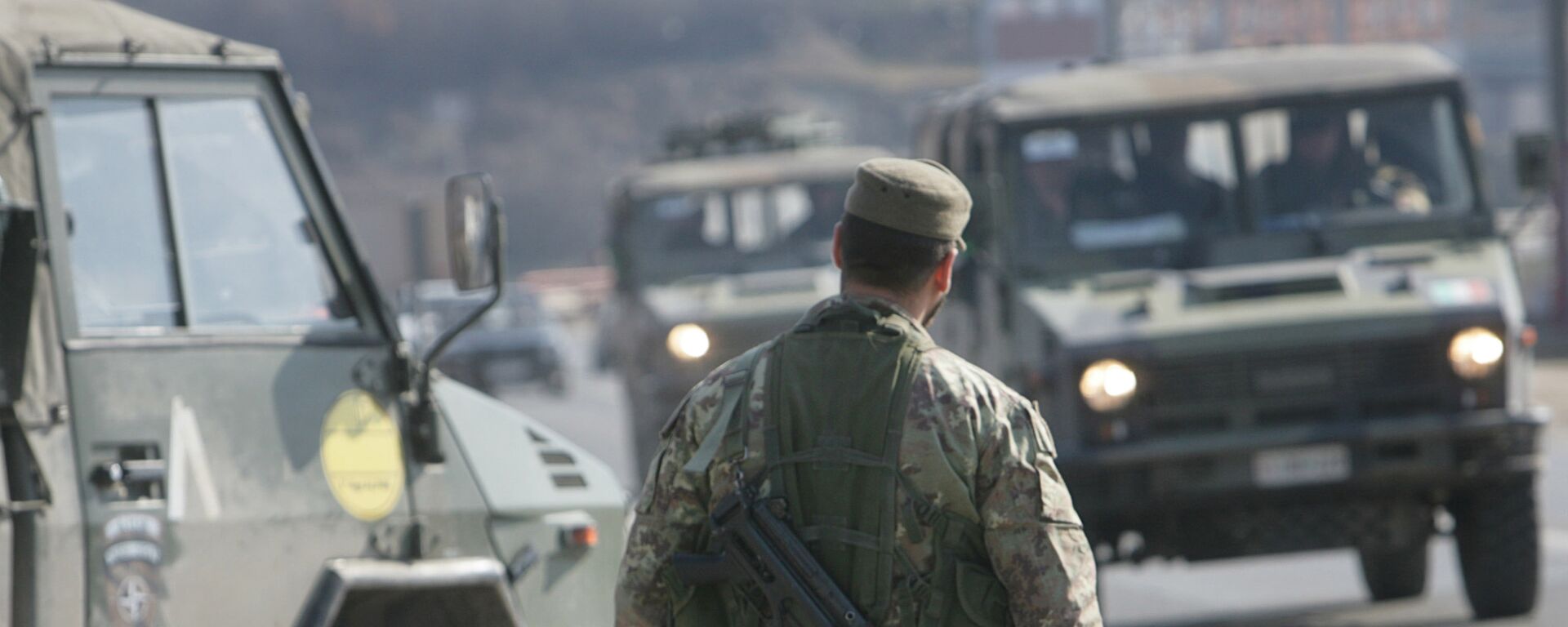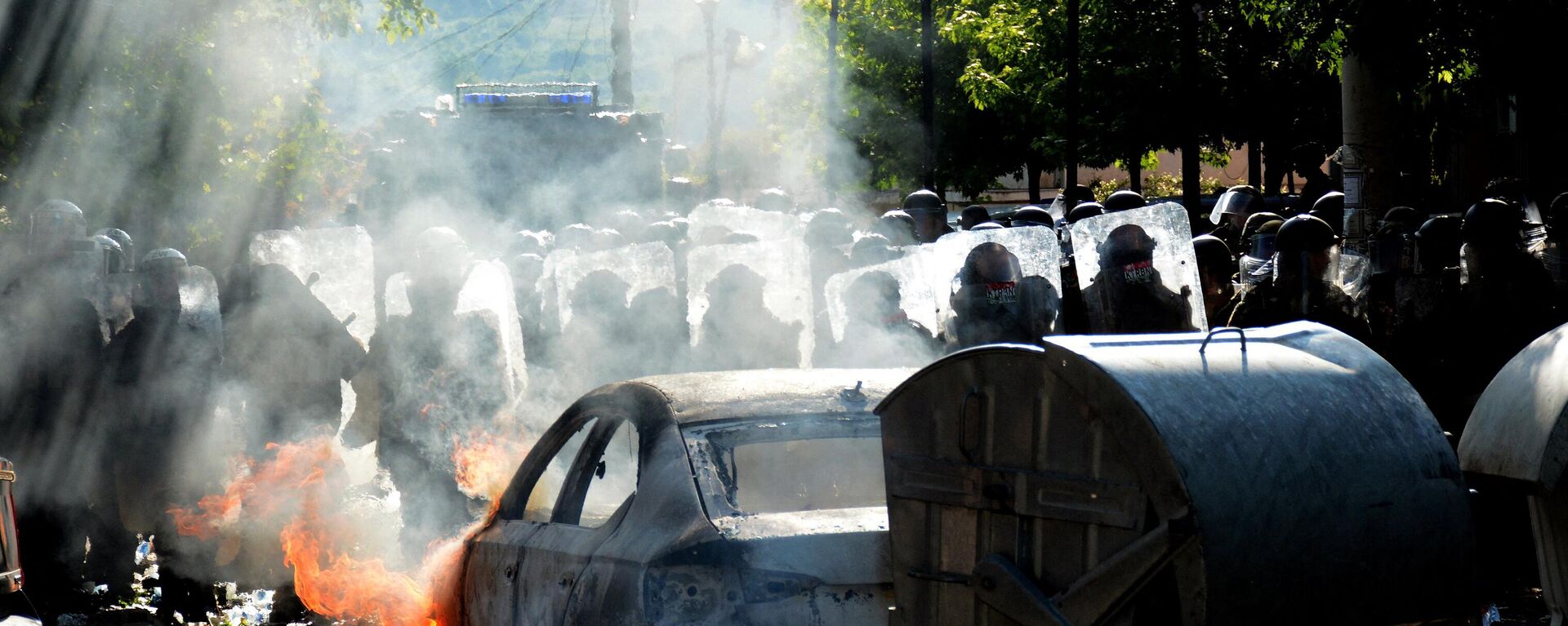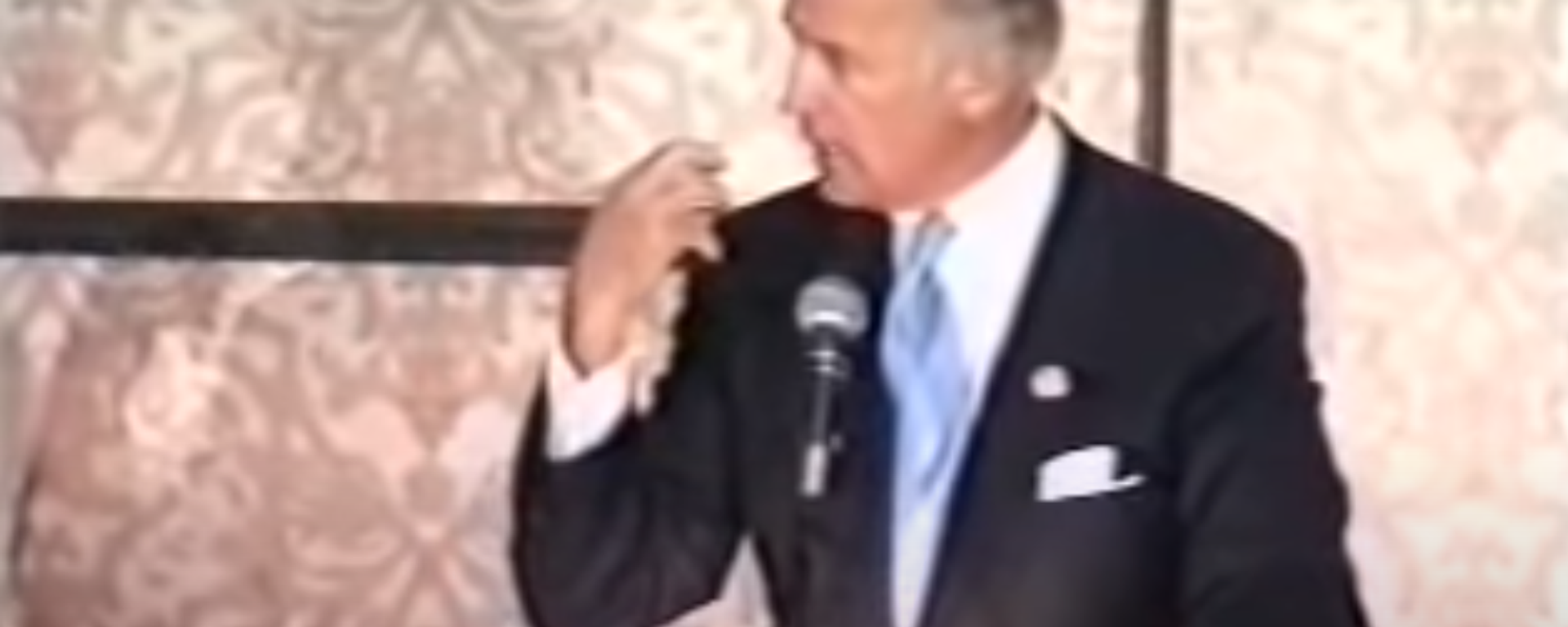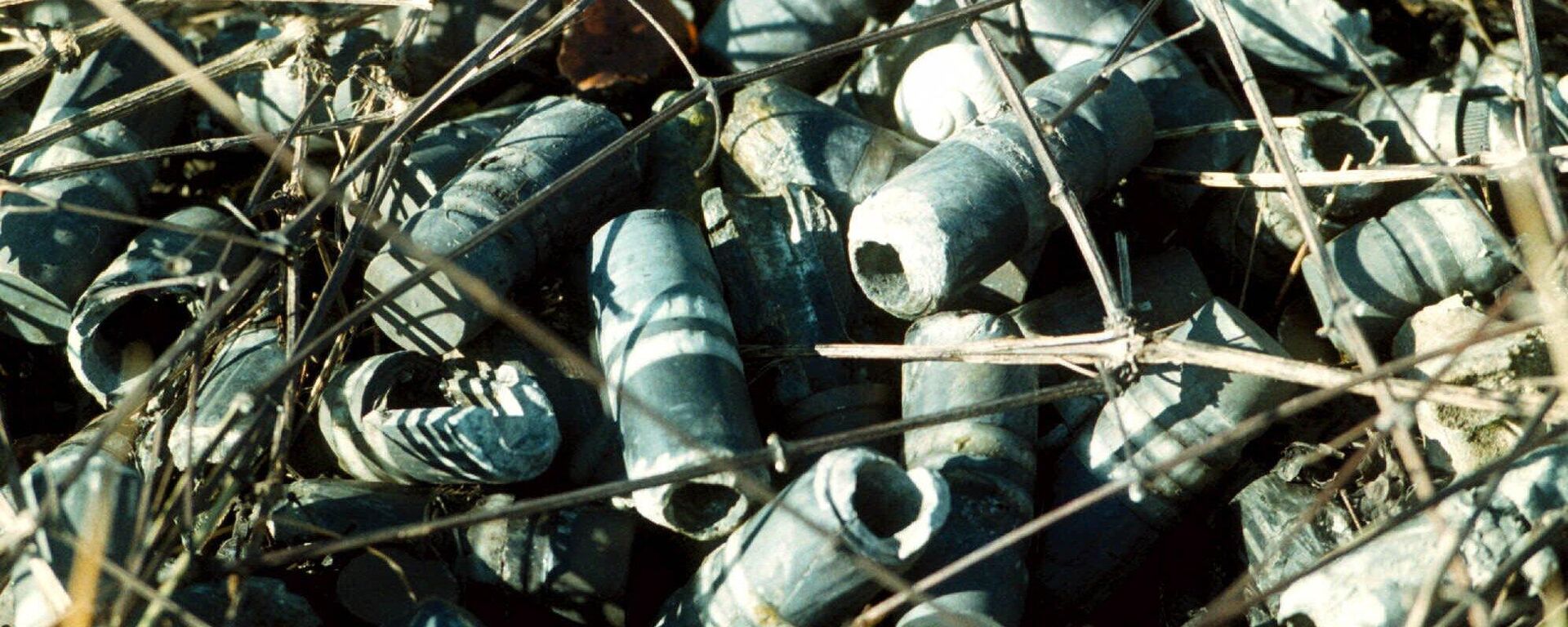https://sputnikglobe.com/20230530/explosion-in-the-heart-of-europe-whats-going-on-in-kosovo-1110799134.html
'Explosion in the Heart of Europe': What's Going on in Kosovo?
'Explosion in the Heart of Europe': What's Going on in Kosovo?
Sputnik International
A new round of tensions in the Serbian breakaway province of Kosovo spilled into street clashes between the NATO-led occupation force known as Kosovo Force (KFOR) and local ethnic Serb residents on Monday. What caused the escalation? Who’s responsible? And how do ancient and recent history help explain for the present crisis?
2023-05-30T17:29+0000
2023-05-30T17:29+0000
2023-05-30T17:46+0000
albin kurti
aleksandar vucic
kosovo
pristina
belgrade
nato
kfor
european union (eu)
camp bondsteel
serbia
https://cdn1.img.sputnikglobe.com/img/07e7/05/1e/1110798876_0:161:3068:1887_1920x0_80_0_0_aa6d38a85f20af21560b523cf8729e61.jpg
52 Kosovar Serbs and as many as 41 KFOR troops were injured in street clashes outside a municipal government building in the northern Kosovo town of Zvecan on Monday.The crisis in Kosovo began brewing last Friday, when Serb residents in the municipalities of Leposavic, Mitrovica, Zubin Potok and Zvecan gathered outside local municipal buildings to block ethnic Albanian mayors appointed by the US-backed government in Pristina from entering. The mayors were appointed to their posts after local elections in April, which the vast majority of local Serbs (over 95 percent) boycotted in protest of Pristina's crackdown on autonomy promised in a 2013 EU-brokered agreement but never delivered on.Pristina deployed Kosovar special police units to help install the mayors by force, with police firing tear gas and using water cannons against protesters, and demonstrators in Zvecan responding by throwing rocks. Over a dozen Serbs and five police were reported injured in Friday’s clashes.On Saturday, Kosovar Serb leaders asked Belgrade to suspend its normalization dialogue with Pristina. On Sunday, NATO and the embassies of the so-called Quint countries – the US, France, Germany, Italy and the UK paid lip service to Belgrade's concerns, calling on Pristina to lower tensions and halt attempts to access municipal buildings in Serb-majority municipalities by force. Kosovo prime minister Albin Kurti assured Brussels that the mayors would "provide services to all citizens," and said dialogue on the 2013 EU agreement must be "intensified". Serbian Foreign Minister Ivica Dacic stressed that it was unacceptable for mayors unelected by Serbs to be allowed to govern in Serb-majority municipalities.Straw That Broke the Camel's BackThe deployment of KFOR troops in the streets of the town of Zvecan on Monday proved the last straw, with the beefed up security presence, and KFOR’s attempts to forcibly disperse protesters using tear gas and stun grenades, culminating in clashes between demonstrators and the foreign troops, and causing dozens of injuries among Serbs and mostly Hungarian and Italian KFOR personnel. Western capitals immediately blamed the local population, with one major Western news agency going so far as to claim that the Serbs were the ones using tear gas and stun grenades.Protests in other areas appeared more restrained, with US troops in full riot gear spotted setting up barbed wire around the local town hall in Leposavic, and protesters there throwing eggs at the parked car of the Pristina-picked mayor there.Belgrade responded to the crisis by putting the military on high alert, and deploying troops to the administrative border with Kosovo, with President Aleksandar Vucic holding a televised national address Monday in which he blamed Albin Kurti for the violence, and accused Pristina of deliberately fueling unrest to try to cause a direct clash between Belgrade and NATO. Vucic also attacked KFOR over its activities, saying that instead of defending local Serbs, they were deployed to protect the illegally-appointed mayors.What's Russia Saying?Russian Foreign Minister Foreign Minister Sergei Lavrov warned on Monday that the crisis in Kosovo could escalate into a "huge explosion in the heart of Europe," the same place "where NATO carried out aggression against Yugoslavia in 1999."On Tuesday, Russian Foreign Ministry spokeswoman Maria Zakharova called for decisive steps to be taken to "deescalate" tensions, and "not half-measures like the idea of the Americans to temporarily 'resettle' the new 'mayors' away from municipal buildings to other facilities."The spokeswoman called on the US and its allies to stop blaming Serbs for the violence, and urged Washington not to provoke Belgrade, "which was forced to declare full combat readiness of the armed forces" and send them to the border.Zakharova characterized the KFOR’s presence in the Serbian province an additional "escalation factor," slamming the force for their "unprofessionalism," and role in Monday's violence.United Nations Security Council Resolution 1244 allows Serbia to deploy as many as 1,000 Serbian troops and police in Kosovo to help maintain order there, a fact often ignored by NATO.How Can Tensions Be Defused and the Crisis Resolved?Stevica Dedjanski, head of the Center for Development of International Cooperation, a Belgrade-based international affairs think tank, says the issue of the protection of Kosovo's dwindling Serb community must be brought before the Security Council as soon as possible, and KFOR's mandate reevaluated."It's a very good thing that a few months ago [Serbia] sent a request to KFOR on the return of our security force contingent to the province in accordance with Resolution 1244, because as we see today, KFOR cannot or will not protect Serbs," Dedjanski told Sputnik Serbia.Washington is always playing the same game in Kosovo, Dedjanski said – first creating a crisis, and then 'calling on both sides to refrain from violence', resulting in the "creeping" implementation of their strategic goals. "To expect help from America is to harbor illusions, and we must realize that we will never, ever get help from them," he noted.Goran Petronijevic, a high-profile defense attorney and international affairs observer, concurs with Dedjanski's assessment, and with Lavrov's sentiments about the "explosive" nature of the Kosovo crisis. He suggests that Russia's recent successes against NATO in Ukraine have pushed the forces of "neoliberal globalism" to look to "create a new hot spot.""We already have experience with KFOR," University of East Sarajevo political science professor and geopolitical analyst Srdjan Perisic told Sputnik Serbia."While it's not fully NATO and includes countries which aren't part of NATO, in any event, NATO is losing its war against Russia, having failed to resolve deep problems in the Balkans in its favor over the past thirty plus years. And today NATO is once again searching for a 'new space'" for operations. "We Serbs can’t come to an agreement with the West. Whatever agreement we reach, they fail to comply with it. The Dayton Accords were written by American lawyers, and the US has been consistently violating them for 28 years. They violate Resolution 1244. They forced the Brussels Agreement on us, but don't want to implement it either! They violated the Minsk Agreements the same way," Perisic said.Kosovo's Special Place in Serbia's HistoryWhile the province of Kosovo is today mostly populated by ethnic Albanians, who make up over 90 percent of the breakaway’s population, and who proclaimed independence in 2008 and established a de facto NATO protectorate in the province, that hasn’t always been the case. Kosovo's ethnic Serb population was cut in half over the past three decades following a series of ethnic cleansing campaigns and pogroms by Kosovar Albanian militants, as well as the 1999 NATO bombing campaign, with the population of about 194,000 Serbs recorded in the 1991 census dropping to about 100,000 now, and most residents fleeing to the province’s northern areas.The outflow of Serbs from Kosovo in the second half of the 20th century first became a serious concern in the 1980s, with Yugoslav leader Josip Broz Tito’s death in 1980 giving rise to a series of competing nationalisms which ultimately tore Yugoslavia apart in the 1990s (with the West's support).Kosovo has a special significance to Serbs both historically and in the formation of Serbian national identity, once containing many of the country’s oldest Orthodox Churches (over 150 of which were destroyed between 1999 and 2004).The 1389 Battle of Kosovo, in which Serbian Prince Lazar managed to hold off a numerically superior Ottoman army, is seen by many Serbs as a symbol of the nation's resistance against overwhelming odds, and a motivator for the endurance of Serbian culture and language through five centuries of occupation. In other words, Kosovo is the birthplace of Serbian national identity.The direct origins of the present crisis can be traced back to the Kosovo War of 1998-1999, in which a CIA-trained and equipped militant force known as the "Kosovo Liberation Army" began a guerrilla conflict with Serbian police and the military with the aim of achieving independence, and NATO intervening in the crisis in March of 1999 in a 78-day bombing campaign of the rump state of Yugoslavia. The conflict culminated in the ouster of Serbian security forces, and the creation of a massive NATO military garrison at Camp Bondsteel – the largest US military base in the Balkans.Kosovo proclaimed independence in 2008, and formally applied for European Union membership in late 2022. Belgrade and the overwhelming majority of the UN's members, including Russia, refuse to recognize Pristina’s new status.
https://sputnikglobe.com/20230529/european-parliament-rapporteur-urges-pristina-to-withdraw-forces-from-north-kosovo-1110777653.html
https://sputnikglobe.com/20230530/decisive-steps-needed-to-ease-tensions-in-kosovo-not-wests-half-measures---moscow-1110793799.html
https://sputnikglobe.com/20220324/we-should-go-in-on-the-ground-watch-biden-complain-nato-bombing-of-yugoslavia-not-ruthless-enough-1094148230.html
https://sputnikglobe.com/20221122/kosovo-serbias-open-wound-1104552715.html
https://sputnikglobe.com/20230325/nato-unleashed-tons-of-depleted-uranium-on-yugoslavia-toxicologist-1108766836.html
kosovo
pristina
belgrade
serbia
russia
Sputnik International
feedback@sputniknews.com
+74956456601
MIA „Rossiya Segodnya“
2023
News
en_EN
Sputnik International
feedback@sputniknews.com
+74956456601
MIA „Rossiya Segodnya“
Sputnik International
feedback@sputniknews.com
+74956456601
MIA „Rossiya Segodnya“
kosovo, serbia, russia, belgrade, pristina, yugoslavia, history, politics, nato, kfor, escalation, tensions
kosovo, serbia, russia, belgrade, pristina, yugoslavia, history, politics, nato, kfor, escalation, tensions
'Explosion in the Heart of Europe': What's Going on in Kosovo?
17:29 GMT 30.05.2023 (Updated: 17:46 GMT 30.05.2023) A new round of tensions in the Serbian breakaway province of Kosovo spilled into street clashes between the NATO-led occupation force known as Kosovo Force (KFOR) and local ethnic Serb residents on Monday. What caused the escalation? Who's responsible? And how do ancient and recent history help explain for the present crisis?
52 Kosovar Serbs and as many as
41 KFOR troops were injured in street clashes outside a municipal government building in the northern Kosovo town of Zvecan on Monday.
The crisis in Kosovo began brewing last Friday, when Serb residents in the municipalities of Leposavic, Mitrovica, Zubin Potok and Zvecan gathered outside local municipal buildings to block ethnic Albanian mayors appointed by the US-backed government in Pristina from entering. The mayors were appointed to their posts after local elections in April, which the vast majority of local Serbs (over 95 percent) boycotted in protest of Pristina's crackdown on autonomy promised in a 2013 EU-brokered
agreement but never delivered on.
Pristina deployed Kosovar special police units to help install the mayors by force, with police firing tear gas and using water cannons against protesters, and demonstrators in Zvecan responding by throwing rocks. Over a dozen Serbs and five police were reported injured in Friday’s clashes.
On Saturday, Kosovar Serb leaders asked Belgrade to suspend its normalization dialogue with Pristina. On Sunday, NATO and the embassies of the so-called Quint countries – the US, France, Germany, Italy and the UK paid lip service to Belgrade's concerns, calling on Pristina to lower tensions and halt attempts to access municipal buildings in Serb-majority municipalities by force. Kosovo prime minister Albin Kurti assured Brussels that the mayors would "provide services to all citizens," and said dialogue on the 2013 EU agreement must be "intensified". Serbian Foreign Minister Ivica Dacic stressed that it was unacceptable for mayors unelected by Serbs to be allowed to govern in Serb-majority municipalities.
Straw That Broke the Camel's Back
The
deployment of KFOR troops in the streets of the town of Zvecan on Monday proved the last straw, with the beefed up security presence, and KFOR’s
attempts to forcibly disperse protesters using tear gas and stun grenades, culminating in clashes between demonstrators and the foreign troops, and causing dozens of injuries among Serbs and mostly
Hungarian and
Italian KFOR personnel. Western capitals immediately blamed the local population, with one major Western news agency going so far as
to claim that the Serbs were the ones using tear gas and stun grenades.
Protests in other areas appeared more restrained, with US troops in full riot gear spotted setting up barbed wire around the local town hall in Leposavic, and protesters there throwing eggs at the parked car of the Pristina-picked mayor there.
Belgrade responded to the crisis by putting the military on high alert, and deploying troops to the administrative border with Kosovo, with President Aleksandar Vucic holding a televised national address Monday in which he
blamed Albin Kurti for the violence, and accused Pristina of deliberately fueling unrest to try to cause a direct clash between Belgrade and NATO. Vucic also attacked KFOR over its activities, saying that instead of defending local Serbs, they were deployed to protect the illegally-appointed mayors.
Russian Foreign Minister Foreign Minister Sergei Lavrov
warned on Monday that the crisis in Kosovo could escalate into a "huge explosion in the heart of Europe," the same place "where NATO carried out aggression against Yugoslavia in 1999."
On Tuesday, Russian Foreign Ministry spokeswoman Maria Zakharova
called for decisive steps to be taken to "deescalate" tensions, and "not half-measures like the idea of the Americans to temporarily 'resettle' the new 'mayors' away from municipal buildings to other facilities."
The spokeswoman called on the US and its allies to stop blaming Serbs for the violence, and urged Washington not to provoke Belgrade, "which was forced to declare full combat readiness of the armed forces" and send them to the border.
Zakharova characterized the KFOR’s presence in the Serbian province an additional "escalation factor," slamming the force for their "unprofessionalism," and role in Monday's violence.
United Nations Security Council Resolution 1244 allows Serbia to deploy as many as 1,000 Serbian troops and police in Kosovo to help maintain order there, a fact often ignored by NATO.
How Can Tensions Be Defused and the Crisis Resolved?
Stevica Dedjanski, head of the Center for Development of International Cooperation, a Belgrade-based international affairs think tank, says the issue of the protection of Kosovo's dwindling Serb community must be brought before the Security Council as soon as possible, and KFOR's mandate reevaluated.
"It's a very good thing that a few months ago [Serbia] sent a request to KFOR on the return of our security force contingent to the province in accordance with Resolution 1244, because as we see today, KFOR cannot or will not protect Serbs," Dedjanski told Sputnik Serbia.
"The real goal seems to be to expel the Serbs by Pristina together with the Americans and other Quint countries. Serbia must not allow this to happen at any cost. We have to protect Serbs there, on the ground, otherwise, if we allow those who killed our children and bombed us in 1999 to drive us and the few Serbs who remain in Kosovo out, everything we did and are doing won’t be worth spit," the observer stressed.
Washington is always playing the same game in Kosovo, Dedjanski said – first creating a crisis, and then 'calling on both sides to refrain from violence', resulting in the "creeping" implementation of their strategic goals. "To expect help from America is to harbor illusions, and we must realize that we will never, ever get help from them," he noted.
Goran Petronijevic, a high-profile defense attorney and international affairs observer, concurs with Dedjanski's assessment, and with Lavrov's sentiments about the "explosive" nature of the Kosovo crisis. He suggests that Russia's recent successes against NATO in Ukraine have pushed the forces of "neoliberal globalism" to look to "create a new hot spot."
"From the moment that the so-called Brussels negotiations began…we had serious doubts about whether these agreements were reliable. They’ve proven to be a deception going on for many years, an attempt to softly push us toward recognizing Kosovo and leaving us with nothing. But in reality, they’re talking about the complete ethnic cleansing of Kosovo from the Serbs," Petronijevic said.
"We already have experience with KFOR," University of East Sarajevo political science professor and geopolitical analyst Srdjan Perisic told Sputnik Serbia.
"While it's not fully NATO and includes countries which aren't part of NATO, in any event, NATO is losing its war against Russia, having failed to resolve deep problems in the Balkans in its favor over the past thirty plus years. And today NATO is once again searching for a 'new space'" for operations. "We Serbs can’t come to an agreement with the West. Whatever agreement we reach, they fail to comply with it. The Dayton Accords were written by American lawyers, and the US has been consistently violating them for 28 years. They violate Resolution 1244. They forced the Brussels Agreement on us, but don't want to implement it either! They violated the Minsk Agreements the same way," Perisic said.
Kosovo's Special Place in Serbia's History
While the province of Kosovo is today mostly populated by ethnic Albanians, who make up over 90 percent of the breakaway’s population, and who proclaimed independence in 2008 and established a de facto NATO protectorate in the province, that hasn’t always been the case. Kosovo's ethnic Serb population was cut in half over the past three decades following a series of ethnic cleansing campaigns and pogroms by Kosovar Albanian militants, as well as the 1999 NATO bombing campaign, with the population of about 194,000 Serbs recorded in the 1991 census dropping to about 100,000 now, and most residents fleeing to the province’s northern areas.
The
outflow of Serbs from Kosovo in the
second half of the 20th century first became a serious concern in the 1980s, with Yugoslav leader Josip Broz Tito’s death in 1980 giving rise to a series of competing nationalisms which ultimately tore Yugoslavia apart in the 1990s (
with the West's support).
Kosovo has a special significance to Serbs both historically and in the formation of Serbian national identity, once containing many of the country’s oldest Orthodox Churches (
over 150 of which were destroyed between 1999 and 2004).
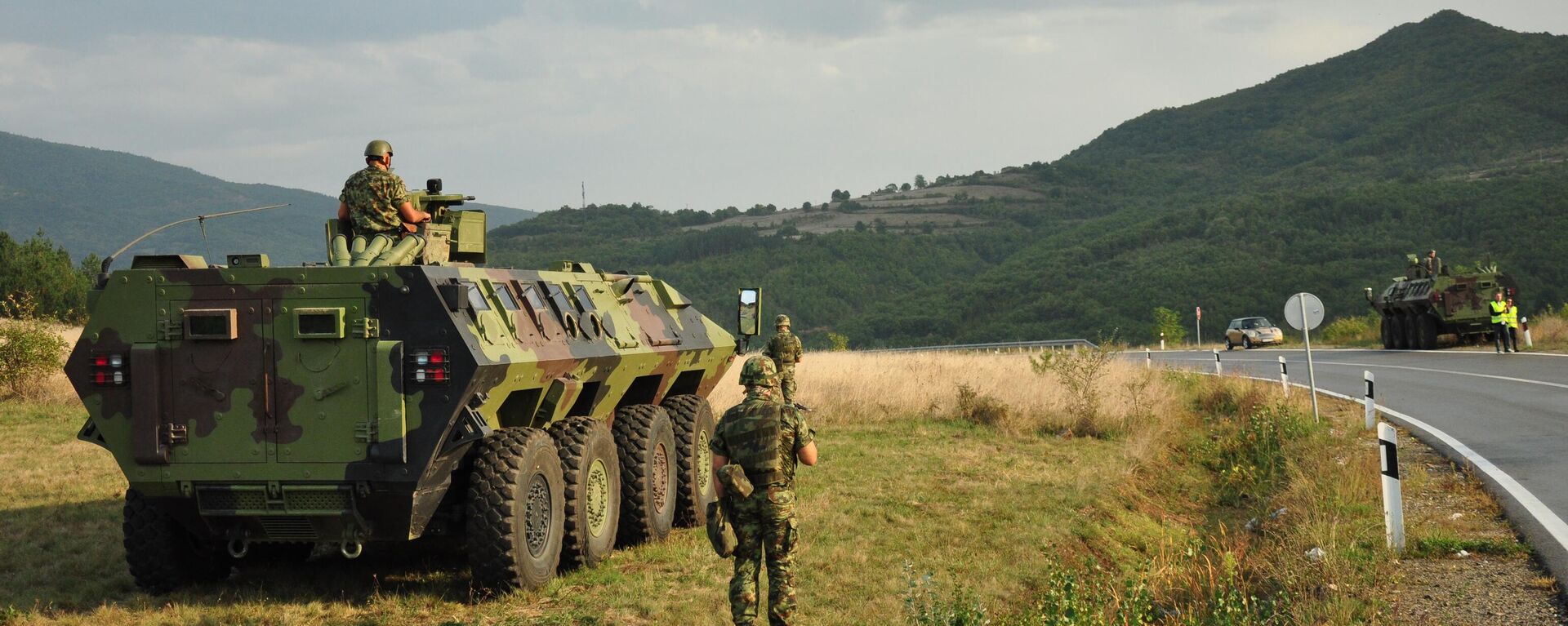
22 November 2022, 14:00 GMT
The 1389 Battle of Kosovo, in which Serbian Prince Lazar managed to hold off a numerically superior Ottoman army, is seen by many Serbs as a symbol of the nation's resistance against overwhelming odds, and a motivator for the endurance of Serbian culture and language through five centuries of occupation. In other words, Kosovo is the birthplace of Serbian national identity.
The direct origins of the present crisis can be traced back to the Kosovo War of 1998-1999, in which a
CIA-trained and equipped militant force known as the "Kosovo Liberation Army" began a guerrilla conflict with Serbian police and the military with the aim of achieving independence, and NATO intervening in the crisis in March of 1999 in a 78-day bombing campaign of the rump state of Yugoslavia. The conflict culminated in the ouster of Serbian security forces, and the creation of a massive NATO military garrison at Camp Bondsteel – the largest US military base in the Balkans.
Kosovo proclaimed independence in 2008, and formally applied for European Union membership in late 2022. Belgrade and the
overwhelming majority of the UN's members, including Russia, refuse to recognize Pristina’s new status.
